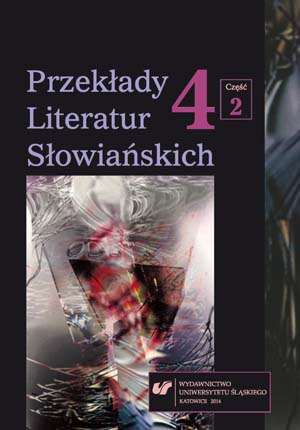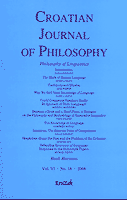
We kindly inform you that, as long as the subject affiliation of our 300.000+ articles is in progress, you might get unsufficient or no results on your third level or second level search. In this case, please broaden your search criteria.





In Devitt’s view, linguistic intuitions are opinions about linguistic pro-duction or products, most often one’s own. They result from ordinary empirical investigation, so “they are immediate and fairly unrefl ective empirical central-processor responses to linguistic phenomena”, which reactions are, moreover, theory-laden, where the ‘theory’ encompasses all sorts of speaker’s beliefs. The paper reconstructs his arguments, places his view on a map of alternative approaches to intuitions, and offers a defense of a minimalistic “voice-of-competence” view. First, intuitions are to be identifi ed with the data, the minimal “products” of tentative lin-guistic production of naïve speaker-listeners, and not with their opinions about the data. Second, the data involve no theory and very little proto-theory. Third, although there might be admixtures of guesswork in the conscious production of data, these are routinely weaned out by linguists. Finally, mere acceptance of the “voice of competence” does not land us in any objectionable Cartesianism: it is compatible with naturalism and with distrust of a priori philosophy.
More...

The author argues that the standard view about language, seen as fair-ly stable abstract system of communication, is a myth. Standard view is badly mistaken and the alternative picture is offered in which there is a core part of our linguistic competence that is fi xed by biology and this provides a basic skeleton which is fl eshed out in different ways on a conversion-by-conversation basis. Why certain people communicate with each other? The answer to this question is not because they speak the same language. We cannot see how communication can emerge from the standard picture of language if we do not start investigating the nature of our linguistic coordination strategies, since there is not a thing there––a language––that helps us to communicate.
More...



This paper considers a form of scepticism according to which sentences, along with other linguistic entities such as verbs and phonemes, etc., are never realized. If, whenever a conversational participant produces some noise or other, they and all other participants assume that a specifi c sentence has been realized (or, more colloquially, spoken), communica-tion will be fl uent whether or not the shared assumption is correct. That communication takes place is therefore, one might think, no ground for assuming that sentences are realized during a typical conversation. I re-ject both this ‘folie-à-deux’ view and the arguments for it due to Georges Rey. I do so by drawing on Gilbert Harman’s no-false-lemmas principle. Since testimony is a form of knowledge and, according to the principle, knowledge cannot depend essentially on false assumptions, testimony is incompatible with the claim that sentence realization is but an illusion. Much of the paper is given over to defending this appeal to the no-false-lemmas principle. After all, a more attractive option might seem to be to infer instead that the principle is itself falsifi ed by the folie-à-deux view.
More...
In his latest book, Michael Devitt rejects Chomsky’s mentalist conception of linguistics. The case against Chomsky is based on two principal claims. First, that we can separate the study of linguistic competence from the study of its outputs: only the latter belongs to linguistic inquiry. Second, Chomsky’s account of a speaker’s competence as consisiting in the mental representation of rules of a grammar for his language is mistaken. I shall argue, first, that Devitt fails to make a case for separating the study of outputs from the study of competence, and second, that Devitt mis-characterises Chomsky’s account of competence, and so his objections miss their target. Chomsky’s own views come close to a denial that speaker’s have knowledge of their language. But a satisfactory account of what speakers are able to do will need to ascribe them linguistic knowledge that they use to speak and understand. I shall explore a conception of speaker’s knowledge of language that confirms Chomsky’s mentalist view of linguistics but which is immune to Devitt’s criticisms.
More...
Elsewhere I have argued that standard theories of linguistic competence are committed to taking seriously talk of “representations of” standard linguistic entities (“SLEs”), such as NPs, VPs, morphemes, phonemes, syntactic and phonetic features. However, it is very doubtful there are tokens of these “things” in space and time. Moreover, even if were, their existence would be completely inessential to the needs of either commu-nication or serious linguistic theory. Their existence is an illusion: an extremely stable perceptual state we regularly enter as a result of being stimulated by the wave forms we regularly produce when we execute our intentions to utter such tokens (a view I call “Folieism”). In his Ignorance of Language, Michael Devitt objects to this view, arguing that, “On Rey’s view, communication seems to rest on miraculous guesses.” I argue here that my view is not prey to his objections, and actually affords a scientifi -cally more plausible view than his “empiricist” alternative. Specifi cally, I reply to his objections that my view couldn’t explain the conventionality of language and success of communication (§2.1), that I am faced with intractable diffi culties surrounding the identity of intentional inexistents (§2.2), and that, contrary to my view, SLEs can be relationally defi ned (§2.3). Not only can Folieism survive Devitt’s objections, but (§3) it also provides a more satisfactory account of the role of linguistic intuitions than the “empirical” account on which he insists.
More...
This paper defends the commonsense conception of linguistic competence according to which linguistic competence involves propositional knowledge of language. More specifically, the paper defends three propositions challenged by Devitt in his Ignorance of Language. First, Chomskian linguists were right to embrace this commonsense conception of linguistic competence. Second, the grammars that these linguists propose make a substantive claim about the computational processes that are presumed to constitute a speaker’s linguistic competence. Third, Chomskian linguistics is indeed a subfield of psychology, in the business of characterizing the linguistic competence of speakers.
More...



